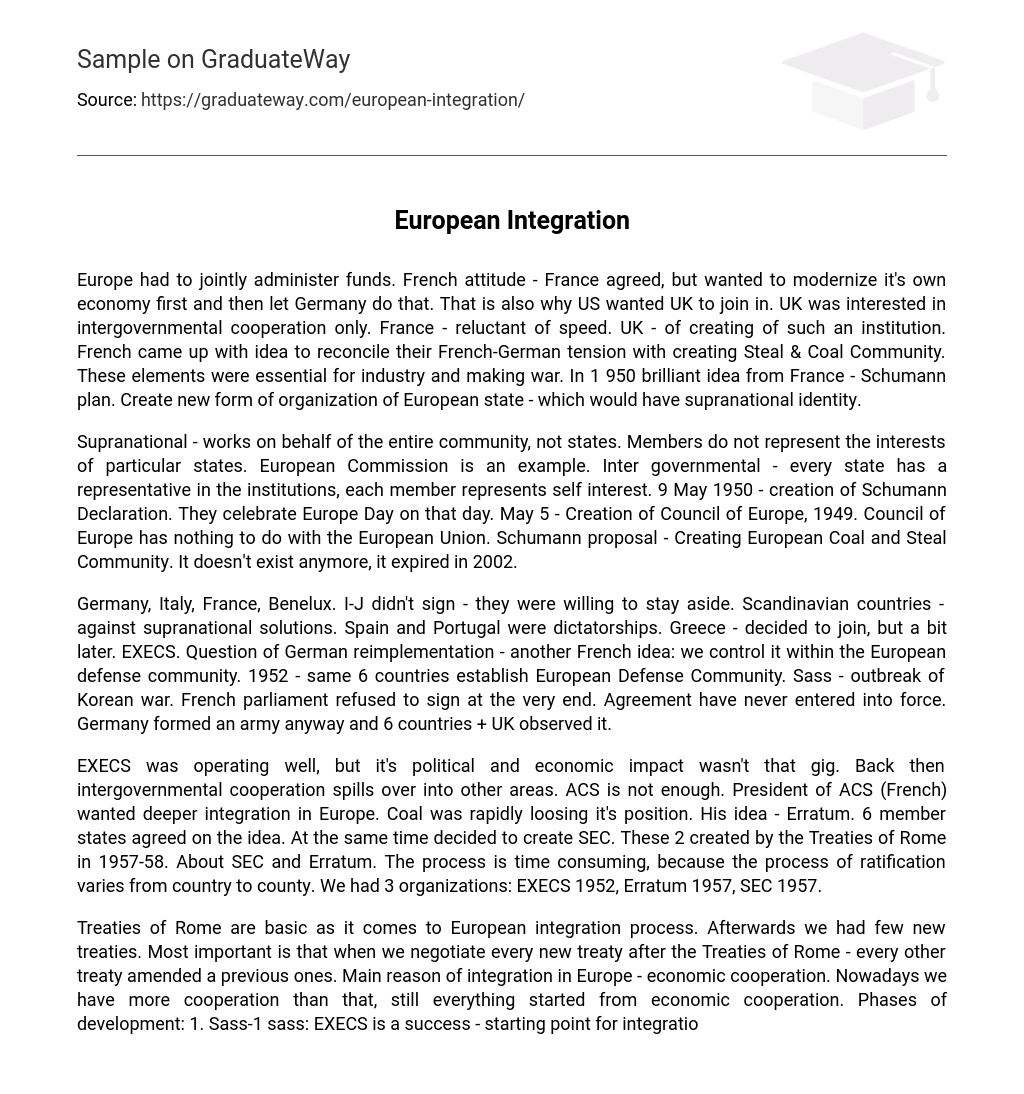Europe had to jointly administer funds. French attitude – France agreed, but wanted to modernize it’s own economy first and then let Germany do that. That is also why US wanted UK to join in. UK was interested in intergovernmental cooperation only. France – reluctant of speed. UK – of creating of such an institution. French came up with idea to reconcile their French-German tension with creating Steal & Coal Community. These elements were essential for industry and making war. In 1 950 brilliant idea from France – Schumann plan. Create new form of organization of European state – which would have supranational identity.
Supranational – works on behalf of the entire community, not states. Members do not represent the interests of particular states. European Commission is an example. Inter governmental – every state has a representative in the institutions, each member represents self interest. 9 May 1950 – creation of Schumann Declaration. They celebrate Europe Day on that day. May 5 – Creation of Council of Europe, 1949. Council of Europe has nothing to do with the European Union. Schumann proposal – Creating European Coal and Steal Community. It doesn’t exist anymore, it expired in 2002.
Germany, Italy, France, Benelux. I-J didn’t sign – they were willing to stay aside. Scandinavian countries – against supranational solutions. Spain and Portugal were dictatorships. Greece – decided to join, but a bit later. EXECS. Question of German reimplementation – another French idea: we control it within the European defense community. 1952 – same 6 countries establish European Defense Community. Sass – outbreak of Korean war. French parliament refused to sign at the very end. Agreement have never entered into force. Germany formed an army anyway and 6 countries + UK observed it.
EXECS was operating well, but it’s political and economic impact wasn’t that gig. Back then intergovernmental cooperation spills over into other areas. ACS is not enough. President of ACS (French) wanted deeper integration in Europe. Coal was rapidly loosing it’s position. His idea – Erratum. 6 member states agreed on the idea. At the same time decided to create SEC. These 2 created by the Treaties of Rome in 1957-58. About SEC and Erratum. The process is time consuming, because the process of ratification varies from country to county. We had 3 organizations: EXECS 1952, Erratum 1957, SEC 1957.
Treaties of Rome are basic as it comes to European integration process. Afterwards we had few new treaties. Most important is that when we negotiate every new treaty after the Treaties of Rome – every other treaty amended a previous ones. Main reason of integration in Europe – economic cooperation. Nowadays we have more cooperation than that, still everything started from economic cooperation. Phases of development: 1. Sass-1 sass: EXECS is a success – starting point for integration. ETC – failure. Succeeded in economic cooperation, but failed in common defense establishing.
States were not ready to cooperate strongly on political level. Ideology that gathered all European states against USSR. Economic cooperation was #1 , ideology – Traditionally states were wary of their independence. The entire idea came from France. Within the phase 1 there came the empty chair crisis – Charles De Geol. was interested in agricultural cooperation. Financing global agriculture policy would protect French agricultural sector. They wanted to keep high prices of agricultural products, despite the law prices outside. Take decision on majority vote ; take decision against one state’s interest.
Protecting their own national interest. France was ring to get different way of voting. Luxemburg compromise – use of veto in vital for national security situations. 65 – Merger Treaty: creating one single council for SEC Erratum & EXECS. 2. 1970+1992: beginning of the hard period and general economic crisis; try to integrate the economy more, or stop? The main agreement that came up in this period: creating internal market; states decided to go further with other policies; not only strictly economical cooperation, also coordinating environmental and research policies.
In 1987 there was Single European act: made next step in creating he internal market, speeding up the process by new legislative decisions. During this phase we had enlargement: 1 973 – Denmark, Ireland, ELK. Norway rejected through public referendum. I-J – made a lot of fuss within ought 6 (these who created). France was against, because it wanted to be a leader & UK cooperates with US (when UK joins, it would make the entire idea change because of the IIS influence, F was afraid that that way US could influence decision making within the European Community).
At the very beginning, France was strongly against K joining. Currently we have 9. 1 981 Greece 986 – Spain, Portugal Now we have 12. External impacts: ass – oil crisis, impacted decision making, provoked more cooperation. 1 974 – establish formally European Council (consists of heads of states, summit council). Decision making has tremendous impact on CE states. European parliament – since 1 975? Members are directly elected. End of the second phase began with Single European Act. People were not very satisfied with it, mainly because of collapse of USSR.
New reality: collapse of communism, have to deal with the completely new situation. Establish new relations with newly created countries. All the provisions of the Single European Act were not sufficient to respond to new reality. Everything started with the concept Of stability in Europe – has to do with security issues. Have to respond to the needs to Eastern European states. Also someday these new states might join. 3. Masochist Treaty – 1993. Amsterdam Treaty in 97. Niece . Lisbon.





